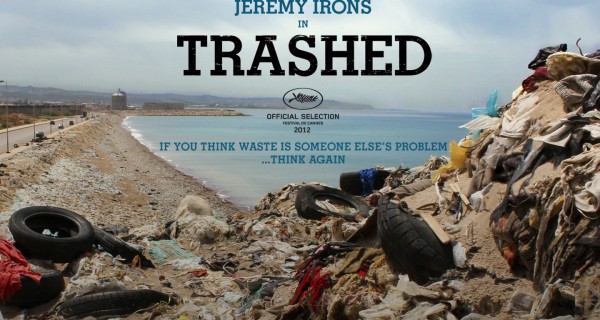A Movie Review: Trashed
On Tuesday night I went to a movie night hosted by Transition Town Guildford for the documentary Trashed. Released in 2012 and featuring Jeremy Irons, Trashed explores the extent of the global waste problem, and the consequences – including pollution in beautiful and uninhabited environments, the health risks to animals, humans and children, and the contamination of the oceans.
When I say ‘explores’, this movie does not just skim the surface. It gets right in there. It’s a powerful film, and it gets the point across that we need to change the way we do things. If you’re not convinced before the film, you won’t be left with any doubt afterwards that waste is a serious problem – and it affects all of us.
Featuring farmers from France and Iceland, hospital works in Vietnam, and waste disposal sites in the UK, Lebanon and Indonesia, it is clear that this is a global issue.
Here’s the trailer:
I loved the message, the depth of the science and the exploration of the facts. It was hard-hitting and some people, particularly those who aren’t already aware of the issues surrounding waste may find it pretty confronting. They tried to end on a positive note, bringing the movie back from the feeling of impending doom, with just enough positivity for the audience to leave without feeling like it was all too hard and all too much. But only just.
My only real criticism was the lack of exploration of the issues surrounding recycling. Clearly there wasn’t space to cover everything, but I felt that plastic recycling in particular could have been further addressed. At the end of the film they show huge bales of plastic waiting to go to China (from San Fransisco) for recycling, but no mention is made of the issues of transporting huge amounts of plastic across the ocean, nor the hazardous processes involved with recycling the plastic in countries with less stringent safety regulations.
Particularly after they talked in length of the dangers of burning waste, I felt this was a glaring omission.
The other interesting point is that this segment of the film was recorded in 2009. Back then, China was a huge buyer of plastic waste, but the plastic shipments were often contaminated with non-recyclable plastic and other debris, and in February 2013 China has cracked down on this with Operation Green Fence, meaning all plastics must be washed and uncontaminated. All shipments are inspected on arrival, and if they are contaminated they are sent back, with the sender incurring the cost. In the first 3 months, 7600 tons of waste were rejected.
I’d definitely recommend watching it, but if you’re new to the issues of waste, you might find it gentler starting with the Clean Bin Project or my all-time favourite, Bag it!.
If you’re interested in hosting a screening of your own, you can find the details on the Trashed website.
Have you seen this movie? What did you think? Did you find it motivating, or did you think they stepped over the line into Doomsday-ville? If you haven’t seen it, what were your thoughts after watching the trailer? Leave me a comment; I’d love to hear what you think!
[leadpages_leadbox leadbox_id=1429a0746639c5] [/leadpages_leadbox]






I haven’t seen the movie, and I really want to – but I don’t really like the model – even though I wholeheartedly understand it. I don’t want to campaign to people who aren’t open to it, and I don’t want to have to run an event, I just would rather borrow it from my library…
I can’t WAIT til it becomes a mainstream issue – I really can’t. It drives me nuts that some people/seemingly cultures think you must get a plastic bag for EVERYTHING YOU EVER BUY OR CARRY. Insane. Sadly, I’m a lot worse with waste and trash that I was. It’s the compromises I’ve made to live more peacefully with my partner – otherwise it’s my crusade. I still take plastics back to Coles, and compost in the community compost, but we order groceries online now, and yesterday, when I didn’t have my bag, and I was out (rare not to have my silk bag), I used a plastic bag.
I don’t know whether their model is not to stock the film in libraries – the problem is, most of these movies are too niche for libraries to stock in the first place. Yes, I think you’d like it – and maybe your boyfriend would find it enlightening too! ; )
I went to a cafe today with my boyfriend’s mum. It was 14.22, and they closed at 3pm, but she said we could only have coffee in a takeaway cup. I said we were avoiding plastic, and she said, oh they’re made of paper! GRRR! I explained no they’re not; I really wanted to make her read my blog! I had my glass KeepCup on me, but only the one and there were two of us, but I persuaded her to give me a real glass. Why they are using takeaway cups when they are still open for another 40 minutes (and had zero other customers – it’s a tiny cafe) I have no idea. I could teach these places a thing or two! Maybe I should! x
Agreed~ I explain to people that paper can’t hold water… they are plastic coated. I live for the day the budget cuts at work force everyone to the ceramic ones we have in the cupboard!
So you wouldn’t believe it – today I got an email through my food coop about someone screening trashed, so there you go! Sorted! And after my holiday (leave tomorrow). WIN!
Hurrah! It was meant to be. I hope you’re dragging your boyfriend along ; )
Make sure you come back and tell me what you think once you’ve seen it!
The movie Trashed, directed by Candida Brady, was a masterfully written and beautifully narrated documentary that depicts the overpowering issue of waste in our society. Jeremy Irons, the film’s narrator, introduces the problem of trash disposal around the world and the devastating effects that it has on our health and the environment. One of the major issues the film focuses on is how our society is becoming an increasingly throwaway society, highlighting such facts as how humans dispose of 200 billion plastic bottles and 58 billion styrofoam cups every year. Trashed was an eye opener, to say the least, from the very get go when the filmmaker introduces the world as looking perfect from up in space. This is such a true statement, but as we journey through the film the daunting images we see throughout paint a much different and very emotional story. Candida Brady and Jeremy Irons present the issue of trash disposal around the world, provide expert testimony detailing the health issues our waste is causing, introduce how businesses and farms are being affected, and provide examples of how people are attempting to remedy the situation. Between the horrifying images and the eye opening facts Trashed portrays, one would be hard pressed to find any viewer of the film that won’t, at the very least, think twice before just tossing away another plastic water bottle.
The film has many strengths, the first being the strong imagery that accompanies the information presented by the narrator. From the disheartening scenes of the many beaches covered in trash a few feet high, to the dolphins and seals hopelessly caught in plastic netting, to the scenes of the landfills polluting the air less than a mile from a small town, Trashed paints a vivid picture of the sad state of affairs for waste removal in this country. These images accompany some very powerful facts, for example how chromium-6 (also known as hexavalent chromium, a known carcinogen), cadmium and many other toxic chemicals are being found when ground samples and drinking water samples are being taken, and how the government is attempting to make us believe that they are “unlikely to be associated with risks to our health”.
Another strength of the film is that many different views and opinions are
presented on the issues, there are different proposed solutions for these problems, and issues with these solutions are presented as well to make for a very well rounded view of waste management.
While the film has many strengths, there are some notable weaknesses found throughout. The first and most potent example is that, although the facts are staggering, some of the information provided is grossly over exaggerated and really used for shock value. Irons ventures to Vietnam to visit a hospital for disfigured children whose parents were exposed to Agent Orange released by the United States during the Vietnam War. The point he attempts to make here is that Agent Orange, a toxic herbicide, contains dioxins much like the ones released by incinerators into the atmosphere which can cause genetic defects. While it is true that incinerators release dioxins into the atmosphere, the concentration is far, far less than the amount contained in Agent Orange and exposure to these would not cause the type of genetic mutations that affected the people in Vietnam.
Another weakness of the film is that it spends entirely too much energy blaming the waste atrocity on everyday Americans. While we do contribute to this problem, many of us are conscious of what we throw out, recycle, use paper instead of plastic, and lobby for proactive solutions to the problem. The film needed to attribute more time to explaining how large industry and businesses are a major cause of waste production throughout the world and have an enormous impact on the problem at hand. Irons harsh words are sometimes belittling to the public and I’m sure that all of the experts and filmmakers aren’t complete saints when it comes to waste production.
Although the film has some pitfalls, Trashed was a triumphant film that certainly accomplishes its goal of shedding light upon the tragic issue of waste. Overall, the film flowed smoothly, provided viewers with great information, included viewpoints from highly qualified experts, and had the best interests of our future at hand. I would recommend this film to anyone who is interested in the sustainability of the environment and to anyone who loves a truly eye-opening film about how to make a difference and become part of a solution to a growing ecological problem.
Ahem…quite a response! Almost as long as the movie itself… : p I notice that it’s written in a narrative context – are you going to let on and tell me what you actually thought of the movie personally?